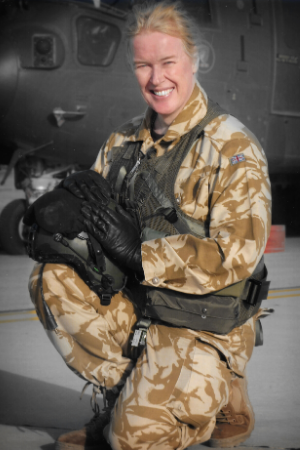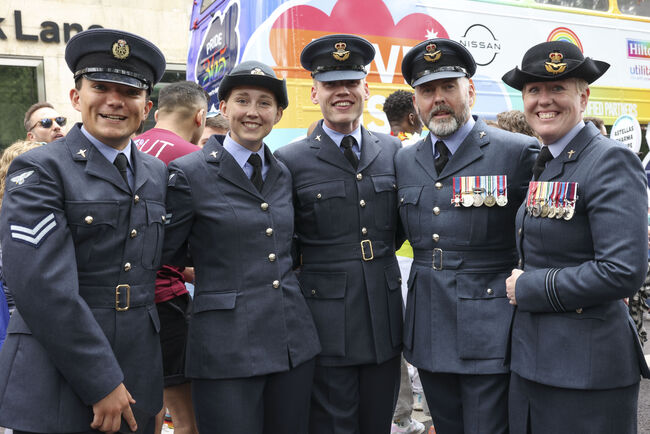
LGBTQ+ History in the RAF
Published:
Categories:
To mark LGBTQ+ History Month this February, the RAF Benevolent Fund has collaborated with the RAF LGBTQ+ Network to highlight the important milestones and events that have ignited change for the LGBTQ+ community within the RAF and armed forces and continue to today.
1999
Flt Lt Caroline Paige becomes the first transgender officer to serve openly in the UK Armed Forces

Flight Lieutenant Caroline Paige joined the RAF in 1980 and, after a lifetime of hiding her gender identity, was granted permission with the support of her unit medical officer to transition gender and remain in service.
Caroline said: “Being allowed to transition gender and remain in service was a truly incredible experience, finally being allowed to be me, properly, openly, and to live my life how I had always dreamt of doing, but never believing it could become possible; it was just staggering! I was proud, and incredibly happy, the happiest I had ever been, but also worried and nervous, as to how people would react.”
Since her retirement from the RAF in 2014, Caroline has used her story to raise awareness, speaking on the benefits of diversity and inclusion, has appeared on TV and radio, and co-founded Fighting With Pride, the UKs first LGBT+ military charity.
2000
Ban on LGB personnel in UK Armed Forces being able to serve openly is lifted
In 2000, the UK Ministry of Defence (MoD) lifted the ban on lesbian, gay, and bisexual individuals serving openly in the military, following a series of talks between Pride London and the MoD, convened by the Equality and Human Rights Commission and Stonewall.
This was a crucial step toward ending discrimination based on sexual orientation within the armed forces. The decision was driven by legal advancements and a broader understanding of human rights.
2005
First civil partnership in the UK Armed Forces between two RAF personnel
The Civil Partnership Act 2004 took effect on 5 December 2005 in the UK, marking the commencement of the period when same-sex couples could officially declare their intent to enter a civil partnership.
The Act enabled same-sex couples aged 16 years and over to obtain legal recognition of their relationship. An RAF couple were the first same-sex couple in the military to have a civil partnership.
2006
Formation of RAF LGBT+ forum
The RAF has formed many Diversity Networks over the years including the RAF Freedom Network and RAF LGBT+ Network. These were set up to identify role models within the community, support LGBT+ personnel and family, shape policies and raise awareness through education.
Sgt Mike Taylor, Vice-Chair (Support) of the RAF LGBTQ+ Network said: “A group of eight personnel from across all ranks came together at Air Command RAF High Wycombe to discuss how we as a community could support the Equality and Diversity team. The E&D team at the time was small with only three people.
“A meeting was held with the eight personnel as Subject Matter Experts to help drive the changes we have seen over the years. We aided the team to identify the issues and areas of priority to work on and help drive change. From these discussions, the RAF LGBT Forum was born, and I became one of the initial deputy chairs for the network.”
2006
RAF marches in London Pride parade for the first time
In 2006, the RAF marched for the first time at London Pride. Although wearing plain clothes, this was an important step to demonstrate a public show of acceptance to the LGBT+ community. In the years to follow, all three services came together to march in uniform.
2008

RAF marches in London Pride parade in uniform for the first time
In 2008, members of the military were invited to participate in national and local pride events. On this occasion, LGBT+ members of all three UK Armed Forces marched at London Pride for the first time in uniform.
2012
LGBT+ forum becomes a ‘network’: RAF LGBT+ Freedom Network
With active engagement in policy changes and supporting individuals across a wide spectrum of topics, the LGBT+ Forum has grown since its inception in 2006.
Flt Lt Jordan Stafford-Boutwood, Co-Chair of the RAF LGBTQ+ Network, said: “It was important for the LGBT+ community to see a visual shift from the RAF from ‘we will listen to you’ into ‘we want to engage with you, talk with you, support you and understand what the RAF could do better to empower you to be the best version of yourself’.
“This has made a significant difference to the community, as inclusion within the organisation has matured, the support we have received has increased, as well as education and understanding from our peers. We will continue to keep pace with societal expansion in sexual orientation and gender identity. Our work now is focusing on all sexual orientations and gender identities, to create equity of treatment for all.”
2016
Red Arrows perform flypast over London Pride for the first time

The Red Arrows took to the skies for the first time at the London Pride event in 2016 in a show of support for the lesbian, gay, bisexual and transgender community and LGBTQ+ Armed Forces personnel.
The nine jets performed their red, white, and blue flypast for thousands over the Pride parade, with more than 200 defence personnel marching.
An RAF spokesperson told the Fund: “The Royal Air Force Aerobatic Team is always humbled to be invited to take part in important occasions that bring people together and was excited to carry out a flypast for Pride London in 2016.
“The wonderful images, and response from those at the event, showed how well the flypast was received.
“The RAF recognises that our people must feel proud, empowered and valued for what they do and who they are – we were delighted to show our support for the LGBTQ+ community and those from it who are serving in UK Defence.”
2019
RAF leads the biggest military contingent ever in the parade
The 2019 London Pride event was the biggest to date, with an estimated 1.5 million people taking to the streets to celebrate diversity and campaign for LGBTQ+ rights. More than 250 military personnel from across the services joined the march from Portland Place to Whitehall.
This was an important event as the year 2019 marked 50 years since the Stonewall uprising in New York, a turning point in the global gay rights movement.
2021
Medals returned to dismissed LGBT+ personnel
Former service personnel, who were dismissed from service based on their sexuality, were invited to apply for any medals forfeited as a result of disciplinary action and dismissal during the historic ban on being homosexual in the military, which was lifted in 2000.
2021
Policy changes for those taking HIV medication pursuing military career
In December 2021, people without HIV, but who were taking Pre-Exposure Prophylaxis (PrEP) medication to protect against potential infection, were permitted to join and serve in the Armed Forces with no restrictions.
MoD announced this in recognition of World AIDS Day and part of an ongoing commitment to recognise advances in management of the treatment and prevention of HIV and to ensure the Armed Forces continued to become a more modern and inclusive employer.
Minister for Defence People and Veterans, Leo Docherty, said: “Drug treatment has revolutionised the lives and outcomes of people diagnosed with HIV. As a modern and inclusive employer, it is only right that we recognise and act on the latest scientific evidence. I’m delighted that an exciting and fulfilling career in the armed forces is now open to many more people.”
2023
Lord Etherton Review released examining experiences of LGBTQ+ personnel prior to ban
Lord Etherton's report was an independent review commissioned by HM Government into the experience of LGBTQ+ veterans who served prior to 2000. The report investigated the experiences of 1,145 veterans who served between 1967 and 2000, until the abolishment of the ban.
Following the publishing of the review, Prime Minister Rishi Sunak apologised for the ‘horrific’ historical treatment of LGBTQ+ people who served in the Armed Forces.
Craig Jones MBE, Executive Chair and Caroline Paige, Chief Executive of Fighting With Pride, in a joint statement, said: "This is a deeply emotional moment for both of us, a day we'd hoped for but sometimes wondered if it would actually happen. More importantly, this is the day thousands of veterans whose lives have been blighted by the cruel ban have been waiting for.”
A statement from the Fund said: "All of us at the RAF Benevolent Fund welcome the Etherton Review which gives a voice to those in the LGBTQ+ community who were treated unfairly in the Armed Forces prior to 2000. As an organisation, we strive to be inclusive and are proud to support Fighting with Pride and to have been awarded their Pride in Veterans Standard. We would encourage anyone who was impacted by the ban to contact the RAF Benevolent Fund or Fighting with Pride for support."
As part of the Fund’s wide portfolio of support available for members of the LGBTQ+ community, we would encourage anyone who may benefit from this, to get in contact with the Fund either online, or via telephone.